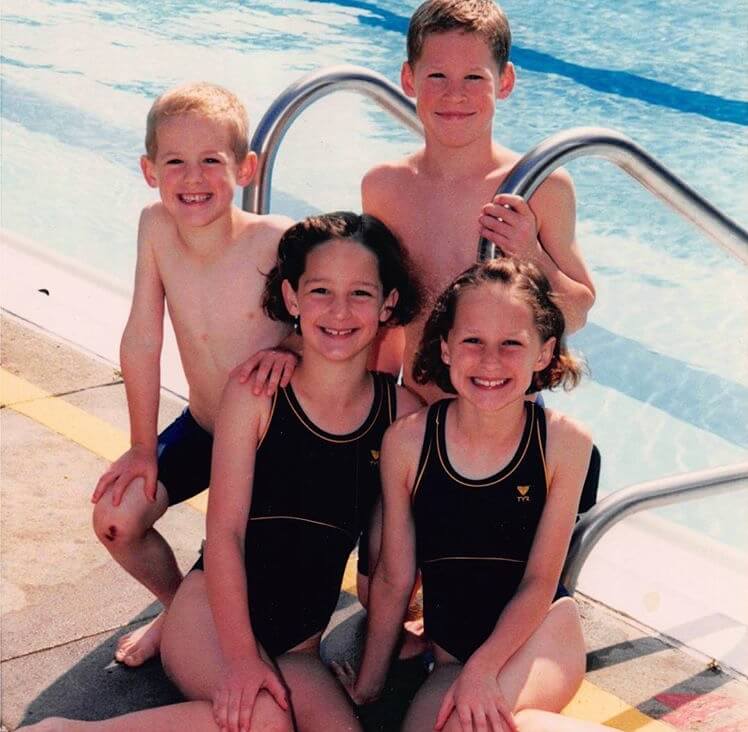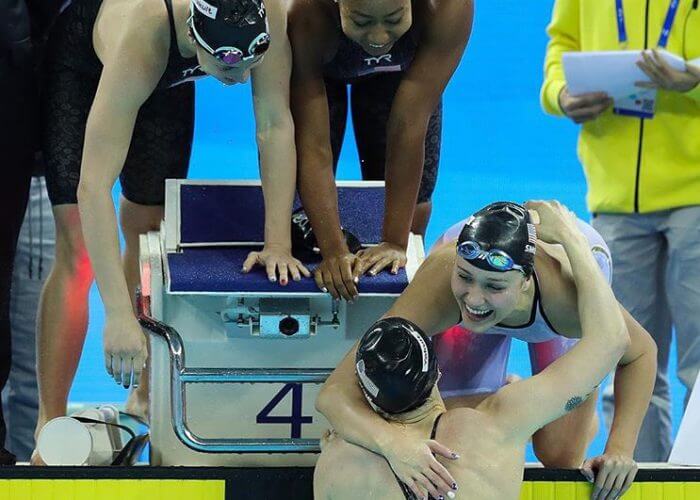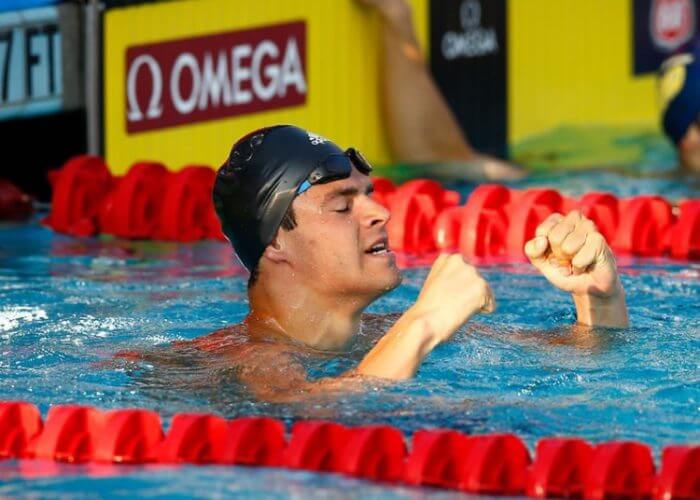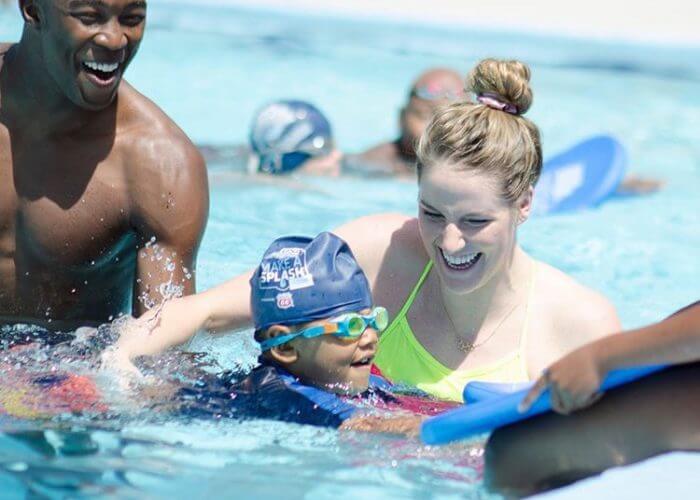Five Take-Aways for Senior Swimmers

By Grace Nordquist, Swimming World College Intern.
If you’re reading this article, odds are that swimming has had a tremendous impact on your life in one way or another. Whether you’ve been swimming your entire life, just started, or are a swim parent or a coach, swimming – like any sport – plays a major part in our identities. When people ask about who you are, a quick response is: “I’m a swimmer.” For the seniors ending their season in the next month or so, their response will be changing from “I am” to “I was a swimmer.”
There’s a saying that athletes die twice: once when they hang up their sport and once when they actually die. While this might be a little dramatic, it really does feel like a part of us is dying when we stop swimming.
Thankfully, swimming is a sport you can do the rest of your life. Most people won’t be swimming a 200 fly at the age of 70, but some easy freestyle is likely. However, there’s something different from swimming recreationally in a pool by yourself versus competing with your team. That something different, for college seniors, is something they’re doing for the last time as this 2019 season comes to an end.
If you’ve already had your senior night meet or it’s approaching soon, you know what to expect. A flood of emotion often accompanied with both tears and laughter. As this time approaches, seniors can reflect on their career with what they’ll take away from the sport.
Here are five things seniors can take away from the sport of swimming:
Memories

Photo Courtesy: Instagram, @usaswimming
No matter how long you’ve been swimming, you will have made countless memories from the sport. It could be the time your teammate slipped on the pool deck or your coach fell in the pool to your most memorable races, such as breaking school records and achieving best times.
Right now, it might not seem like much except simply laughing over a story from “that one meet.” But someday, these will be the stories you tell your children and grandchildren. When you come back to reunions, these are the times you’ll be talking about.
Teamwork

Photo Courtesy: Instagram, @usaswimming
There’s a reason employers like hiring previous student-athletes: because they already know how to work with a team. You may not even realize it now, but this is an exceptional quality that not everyone may possess. You get to be the exception.
It wasn’t always easy being on a team. Sometimes there were fights, a teammate you couldn’t stand, ones who didn’t work as hard as others, or you simply spent way too much time together and drove each other crazy. But someday you’ll have co-workers who do the same thing, and you’ll be able to handle it because of your team. It’s life, and the sooner you can learn to get along with a team the better.
At the end of the day, you had each other’s backs. Even the teammate you couldn’t stand. It didn’t matter the situation; if your teammate needed you, you were there for them. Our teams become our family in college, and our loyalty to one another is something to take pride in.
Time management
As a student-athlete, you had to make some sacrifices, from balancing your class and practice schedule to giving up weekends because of swim meets. You know how to balance your time and handle multiple things at once. This has helped you gain experience employers are looking for.
Looking back, maybe you could’ve had more time to study if you hadn’t swum. You could’ve gone to more events on the weekend. You could’ve taken more naps and had more free time. But would you have felt as accomplished? Looking back now, you get to say you managed school and a sport while also possibly a job, other activities and a social life. Not everyone can do that.
Your future self thanks you in advance. As much as we would like to think life slows down, there’s always something going on. Let’s face it: as student-athletes, we’re driven and used to being busy, so we’ll probably take on multiple tasks as adults as well. Whether it’s balancing your kid’s sports and volunteering, running a weekend event and paying bills on time, or coaching a club swim team and working another job, you can do it all. We only have so much time in life, so why not make the most of every minute and manage it wisely?
Perseverance

Photo Courtesy: Instagram, @usaswimming
Swimming is not easy; it takes hard work and perseverance. We’ve heard it from other athletes: “Swimming is so hard, I don’t know how you guys do it.” To be honest, sometimes our bodies aren’t sure how we did it either. There were practices that only the hardest working and determined of people could make it through. Yet here you are, after years of practices, and you made it.
The fact that you made it through years of practices of one of the hardest sports is a testimony in its own right. Now, whatever life throws your way, know you’re tougher than most people and can persevere through it. When you’re going through something you don’t think you can handle, remember the sets you saw on the board and thought there was no way you could make it through. You may have doubted your own body’s capability but surprised yourself when you conquered obstacles you never thought you would.
Perseverance goes further than physicality. As we know, swimming is also a mental game. A persevering mentality was needed in order to make it through practices, races, and even continuing your career at times. Aside from being physically stronger than most, you’re also mentally stronger. You know how to tell yourself you can and you will. As your swimming career ends, it’s time to continue that mentality from the pool to your everyday life.
Passion

Photo Courtesy: Instagram, @missyfranklin88
Passion. This is the reason you feel the way you do on senior night. This is where the feeling of panic in your chest comes from. It’s when you realize that you’re almost done with the sport that has meant so much to you. The burning passion that may have decreased throughout the years is bubbling up again.
It has been a long time, and odds are you’ve been ready to be done. Your body is ready to retire. But then senior night comes and your last practices and meets are in front of you, and it’s like all the years of swimming flash before your eyes. They say this happens right before you die, and well, a part of you is about to die. It’s your “first death” of hanging up the sport.
Never, never lose this passion. Even if you don’t continue to swim, pass it on to others. You could coach, teach swimming lessons, donate to teams, or simply support them at meets. Find a way to direct your passion into something else in your life, swimming related or not.
Passion is something we don’t talk about but we all have. It’s the same passion in every one of us swimmers that made us crazy enough to do what we do. The passion that will be behind everything we do – even after we’re done swimming – to make us not only outstanding swimmers but also amazing people.
– All commentaries are the opinion of the author and do not necessarily reflect the views of Swimming World Magazine nor its staff.



